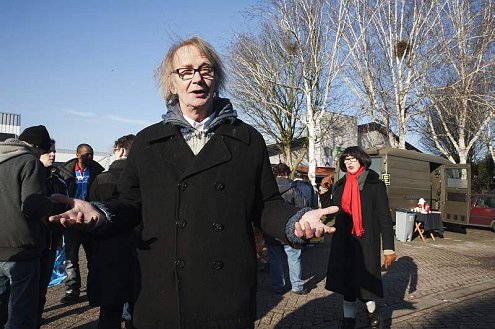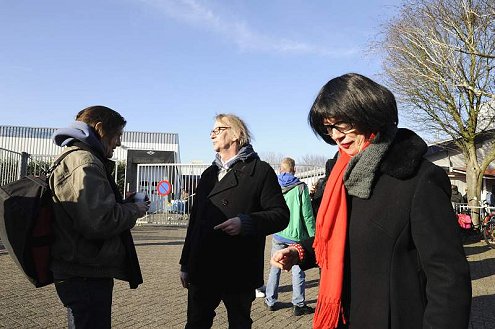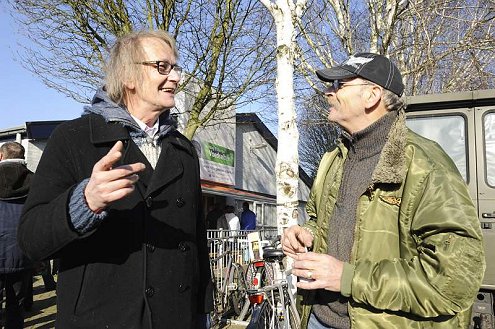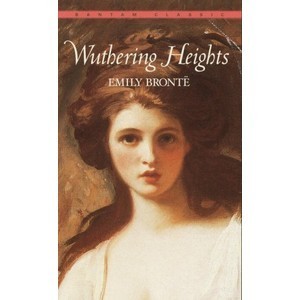Fleurs du Mal Magazine


Or see the index

Thomas Chatterton
(1752-1770)
Song from Ælla
SING unto my roundelay,
O drop the briny tear with me;
Dance no more at holyday,
Like a running river be:
My love is dead,
Gone to his death-bed
All under the willow-tree.
Black his cryne [1] as the winter night,
White his rode [2] as the summer snow,
Red his face as the morning light,
Cole he lies in the grave below:
My love is dead,
Gone to his death-bed
All under the willow-tree.
Sweet his tongue as the throstle’s note,
Quick in dance as thought can be,
Deft his tabor, cudgel stout;
O he lies by the willow-tree!
My love is dead,
Gone to his death-bed
All under the willow-tree.
Hark! the raven flaps his wing
In the brier’d dell below;
Hark! the death-owl loud doth sing
To the nightmares, as they go:
My love is dead,
Gone to his death-bed
All under the willow-tree.
See! the white moon shines on high;
Whiter is my true-love’s shroud:
Whiter than the morning sky,
Whiter than the evening cloud:
My love is dead,
Gone to his death-bed
All under the willow-tree.
Here upon my true-love’s grave
Shall the barren flowers be laid;
Not one holy saint to save
All the coldness of a maid:
My love is dead,
Gone to his death-bed
All under the willow-tree.
With my hands I’ll dent the briers
Round his holy corse to gre [3]:
Ouph [4] and fairy, light your fires,
Here my body still shall be:
My love is dead,
Gone to his death-bed
All under the willow-tree.
Come, with acorn-cup and thorn,
Drain my heartès blood away;
Life and all its good I scorn,
Dance by night, or feast by day:
My love is dead,
Gone to his death-bed
All under the willow-tree.
1 cryne – hair
2 rode – complexion
3 gre – grow
4 ouph – elf
Thomas Chatterton poetry
fleursdumal.nl magazine
More in: Archive C-D, Thomas Chatterton

Joep Eijkens
Poëzieweek in Tilburg: gratis gedichten bij de Voedselbank
Af en toe zie je in Tilburg een militairgroene bus rijden met daarop de woorden Theater van de Verloren Tijd. Onder die mooie naam brengen Sjon Brands (1948) en Dorith van der Lee (1958) al vele jaren een voortdurend wisselend programma van Nederlandse, Vlaamse en Zuid-Afrikaanse poëzie. ‘Wij kennen ieder ruim 600 gedichten uit het hoofd en kunnen daarmee overal op reageren’, meldt het duo op een wervende folder. ‘Wij bogen op ruim 20 jaar ervaring op podia en pleinen van Terschelling tot aan Kaap de Goede Hoop’.
Zo ver hoefden ze afgelopen vrijdagochtend niet te rijden. Ditmaal was de bestemming de Voedselbank in Tilburg-West. In het kader van de nationale Poëzieweek 2014 waren Sjon en Dorith daar neergestreken om de lange rij wachtenden te trakteren op koffie en, zo men wilde, een gedicht. Een welkome onderbreking als je een paar uur staat te wachten voor de bank open gaat. Natuurlijk stond niet ieders hoofd naar poëzie, maar sommigen genoten er zichtbaar en hoorbaar van. Zoals die ene vrouw die helemaal leek te gaan stralen bij een gedicht dat eindigde met ‘Ik hou van jou’. Onder de wachtenden bleken zich trouwens verschillende dichters te bevinden. “Ik heb al vier boeken geschreven”, riep een vrouw. “Maar dat is een heel verhaal”. Ongetwijfeld.











joep eijkens photos & text
fleursdumal.nl magazine
More in: Brands, Sjon, Joep Eijkens Photos, Poëzieweek, Theater van de Verloren Tijd

Edmund Spenser
(1552-1599)
My Love Is Like To Ice
My love is like to ice, and I to fire:
How comes it then that this her cold so great
Is not dissolved through my so hot desire,
But harder grows the more I her entreat?
Or how comes it that my exceeding heat
Is not allayed by her heart-frozen cold,
But that I burn much more in boiling sweat,
And feel my flames augmented manifold?
What more miraculous thing may be told,
That fire, which all things melts, should harden ice,
And ice, which is congeal’s with senseless cold,
Should kindle fire by wonderful device?
Such is the power of love in gentle mind,
That it can alter all the course of kind.
Edmund Spenser poetry
fleursdumal.nl magazine
More in: Archive S-T, Spenser, Edmund

The Sorrows of Young Werther (08)
by J.W. von Goethe
26 May 1771
You know of old my ways of settling anywhere, of selecting a little cottage in some cosy spot, and of putting up in it with every inconvenience. Here, too, I have discovered such a snug, comfortable place, which possesses peculiar charms for me.
About a league from the town is a place called Walheim. (The reader need not take the trouble to look for the place thus designated. We have found it necessary to change the names given in the original.) It is delightfully situated on the side of a hill; and, by proceeding along one of the footpaths which lead out of the village, you can have a view of the whole valley. A good old woman lives there, who keeps a small inn. She sells wine, beer, and coffee, and is cheerful and pleasant notwithstanding her age. The chief charm of this spot consists in two linden-trees, spreading their enormous branches over the little green before the church, which is entirely surrounded by peasants’ cottages, barns, and homesteads. I have seldom seen a place so retired and peaceable; and there often have my table and chair brought out from the little inn, and drink my coffee there, and read my Homer. Accident brought me to the spot one fine afternoon, and I found it perfectly deserted. Everybody was in the fields except a little boy about four years of age, who was sitting on the ground, and held between his knees a child about six months old: he pressed it to his bosom with both arms, which thus formed a sort of arm-chair; and, notwithstanding the liveliness which sparkled in its black eyes, it remained perfectly still. The sight charmed me. I sat down upon a plough opposite, and sketched with great delight this little picture of brotherly tenderness.
I added the neighbouring hedge, the barn-door, and some broken cart-wheels, just as they happened to lie; and I found in about an hour that I had made a very correct and interesting drawing, without putting in the slightest thing of my own. This confirmed me in my resolution of adhering, for the future, entirely to nature. She alone is inexhaustible, and capable of forming the greatest masters. Much may be alleged in favour of rules, as much may be likewise advanced in favour of the laws of society: an artist formed upon them will never produce anything absolutely bad or disgusting; as a man who observes the laws, and obeys decorum, can never be an absolutely intolerable neighbour, nor a decided villain: but yet, say what you will of rules, they destroy the genuine feeling of nature, as well as its true expression. Do not tell me “that this is too hard, that they only restrain and prune superfluous branches, etc.” My good friend, I will illustrate this by an analogy. These things resemble love. A warmhearted youth becomes strongly attached to a maiden: he spends every hour of the day in her company, wears out his health, and lavishes his fortune, to afford continual proof that he is wholly devoted to her. Then comes a man of the world, a man of place and respectability, and addresses him thus: “My good young friend, love is natural; but you must love within bounds. Divide your time: devote a portion to business, and give the hours of recreation to your mistress. Calculate your fortune; and out of the superfluity you may make her a present, only not too often,–on her birthday, and such occasions.” Pursuing this advice, he may become a useful member of society, and I should advise every prince to give him an appointment; but it is all up with his love, and with his genius if he be an artist.
O my friend! why is it that the torrent of genius so seldom bursts forth, so seldom rolls in full-flowing stream, overwhelming your astounded soul? Because, on either side of this stream, cold and respectable persons have taken up their abodes, and, forsooth, their summer-houses and tulip-beds would suffer from the torrent; wherefore they dig trenches, and raise embankments betimes, in order to avert the impending danger.
The Sorrows of Young Werther (Die Leiden des jungen Werther) by J.W. von Goethe. Translated by R.D. Boylan.
To be continued
fleursdumal.nl magazine
More in: -Die Leiden des jungen Werther, Goethe, Johann Wolfgang von

Charles Guérin
(1873 – 1907 )
Epitaphe pour lui-même
Il fut le très subtil musicien des vents
Qui se plaignent en de nocturnes symphonies ;
Il nota le murmure des herbes jaunies
Entre les pavés gris des cours d’anciens couvents.
Il trouva sur la viole des dévots servants
Pour ses maîtresses des tendresses infinies ;
Il égrena les ineffables litanies
Ou s’alanguissent tous les amoureux fervents.
Un soir, la chair brisée aux voluptés divines,
Il détourna du ciel son front fleuri d’épines,
Et se coucha, les pieds meurtris et le coeur las.
Ô toi, qui, dégoûté du rire et de la lutte
Odieuse, vibras aux sanglots de sa flûte,
Poète, ralentis le pas : cy dort Heirclas.
Charles Guérin poetry
fleursdumal.nl magazine
More in: - Archive Tombeau de la jeunesse, Archive G-H, CLASSIC POETRY

POëZIEWEEK 2014
Poëzie in De Nwe Vorst (Tilburg) – Over de Schoonheid van Geweld op 5 februari 2014 Een ontmoeting met twee dichters, die elkaar ook net ontmoeten. Met God en het volk, met stront en angst, oorlogstrommels en halsbanden. Maar gelukkig ook met BOEM! en ding-a-dong.
Met: Carina van der Walt & Daan Taks # Tijdsduur: 15 a 20 minuten # Optredens om 13:30, 15:00 & 16:30 # Gast om 13:30 activiste Joke Kaviaar
theater de NWE Vorst # WillemII-straat 49 # 5038 BD tilburg
Carina van der Walt en Daan Taks Dichter in De NWE Vorst # Tilburgse dichters organiseren gedurende twee weken bijna dagelijks poëzie-evenementen in de Voorkamer van De NWE Vorst. Aanleiding is de Landelijke Poëziedag op 30 januari. Op woensdag 5 februari zijn Carina van der Walt en Daan Taks tussen 13 en 18 uur te gast in onze voorkamer.
fleursdumal.nl magazine
More in: Archive S-T, Archive W-X, Art & Literature News, Poëzieweek, Walt, Carina van der

Sir Walter Scott
(1771-1832)
“Proud Maisie”
Proud Maisie is in the wood,
Walking so early;
Sweet Robin sits on the bush,
Singing so rarely.
“Tell me, thou bonny bird,
When shall I marry me?”
“When six braw gentlemen
Kirkward shall carry ye.”
“Who makes the bridal bed,
Birdie, say truly?”
“The grey-headed sexton
That delves the grave duly.
“The glow-worm o’er grave and stone
Shall light thee steady.
The owl from the steeple sing,
‘Welcome, proud lady’.”
Sir Walter Scott poetry
fleursdumal.nl magazine
More in: Archive S-T, CLASSIC POETRY, Sir Walter Scott

Emily Bronte
(1818-1848)
No Coward Soul Is Mine
No coward soul is mine,
No trembler in the world’s storm-troubled sphere:
I see Heaven’s glories shine,
And faith shines equal, arming me from fear.
O God within my breast,
Almighty, ever-present Deity!
Life–that in me has rest,
As I–undying Life–have Power in Thee!
Vain are the thousand creeds
That move men’s hearts: unutterably vain;
Worthless as withered weeds,
Or idlest froth amid the boundless main,
To waken doubt in one
Holding so fast by thine infinity;
So surely anchored on
The steadfast rock of immortality.
With wide-embracing love
Thy spirit animates eternal years,
Pervades and broods above,
Changes, sustains, dissolves, creates, and rears.
Though earth and man were gone,
And suns and universes ceased to be,
And Thou wert left alone,
Every existence would exist in Thee.
There is not room for Death,
Nor atom that his might could render void:
Thou–Thou art Being and Breath,
And what Thou art may never be destroyed.
Emily Jane Brontë poetry
fleursdumal.nl magazine
More in: Anne, Emily & Charlotte Brontë, Archive A-B, Brontë, Anne, Emily & Charlotte

The Sorrows of Young Werther (07)
by J.W. von Goethe
22 May 1771
That the life of man is but a dream, many a man has surmised heretofore; and I, too, am everywhere pursued by this feeling. When I consider the narrow limits within which our active and inquiring faculties are confined; when I see how all our energies are wasted in providing for mere necessities, which again have no further end than to prolong a wretched existence; and then that all our satisfaction concerning certain subjects of investigation ends in nothing better than a passive resignation, whilst we amuse ourselves painting our prison-walls with bright figures and brilliant landscapes,–when I consider all this, Wilhelm, I am silent. I examine my own being, and find there a world, but a world rather of imagination and dim desires, than of distinctness and living power. Then everything swims before my senses, and I smile and dream while pursuing my way through the world.
All learned professors and doctors are agreed that children do not comprehend the cause of their desires; but that the grown-up should wander about this earth like children, without knowing whence they come, or whither they go, influenced as little by fixed motives, but guided like them by biscuits, sugar-plums, and the rod,–this is what nobody is willing to acknowledge; and yet I think it is palpable.
I know what you will say in reply; for I am ready to admit that they are happiest, who, like children, amuse themselves with their playthings, dress and undress their dolls, and attentively watch the cupboard, where mamma has locked up her sweet things, and, when at last they get a delicious morsel, eat it greedily, and exclaim, “More!” These are certainly happy beings; but others also are objects of envy, who dignify their paltry employments, and sometimes even their passions, with pompous titles, representing them to mankind as gigantic achievements performed for their welfare and glory. But the man who humbly acknowledges the vanity of all this, who observes with what pleasure the thriving citizen converts his little garden into a paradise, and how patiently even the poor man pursues his weary way under his burden, and how all wish equally to behold the light of the sun a little longer,–yes, such a man is at peace, and creates his own world within himself; and he is also happy, because he is a man. And then, however limited his sphere, he still preserves in his bosom the sweet feeling of liberty, and knows that he can quit his prison whenever he likes.
The Sorrows of Young Werther (Die Leiden des jungen Werther) by J.W. von Goethe. Translated by R.D. Boylan.
To be continued
fleursdumal.nl magazine
More in: -Die Leiden des jungen Werther, Goethe, Johann Wolfgang von
![]()
La double vie de Véronique
Bij de film van Krysztof Kieslowski
Een ogenblik pal: het lijkt een jaar te duren.
Zij schroeit zich aan haar eigen beeld – zonder
spiegel, lensloos zelfs. Ziel vanwege onvermoede
dubbelgangster tot in eeuwigheid verscheurd.
Daar zit ze uit het venster van een trein te turen:
het vertekent, maakt strakke vormen ronder
en haar voor nog eens zo’n herkenning op haar hoede.
Zij weet zichzelf in duplo nu. Avondval verkleurt
de stad, werpt vreemde schaduwen op muren.
Ach Veronika, wat ga je mooi in zang ten onder.
Bert Bevers
fleursdumal.nl magazine
More in: Archive A-B, Bevers, Bert

Maurice Du Plessys
(1864-1924)
La chanson d’un soir de tempête
J’ai sablé le vin, j’ai humé les roses ;
J’ai cueilli la fleur du plus beau baiser :
Je ne trouve plus au fond de ces choses
De quoi me griser…
Les jours ont brillé sur ma tête pâle
Sans m’apprendre rien du Tout qu’il y a :
Mon coeur m’apparaît comme sort d’un châle
Un camélia…
Jeunesse, éclair ! jours enfuis comme un rêve !
Flambeaux morts de gloire en cendre à mes pieds,
Le Temps vous a pris comme un aigle enlève
Les sanglants ramiers !
A mes pieds, des flots ô plèbe insultante !
Du lâche Destin prête-nom menteur !
Arrière, Avenir qu’attend sous la tente
Achille et mon coeur !
Passions, passé, crache ça, mon âme,
Comme ces hauts cieux d’éclairs déchirés
Vident par cent trous dans les eaux leur flamme :
Homme, ici mourez !
Non, vivons ! Mais si, dans l’atroce lutte,
Je dois au vain flot céder le terrain,
A ma lèvre expire en silence, Ô flûte
Morte dans l’airain !
Maurice Du Plessys poetry
fleursdumal.nl magazine
More in: Archive O-P, CLASSIC POETRY
![]()
Wetenschap
Ik stuur een lantaarnpaal de stroomrekening
swaffel tegen schrikdraad
en zet zangvogels vast wegens spionage
in meesmuilend doorluchtige taal vertel ik u
dat u een fout hebt gemaakt
en dat dat licht aan het eind van de tunnel
slechts resultaat is van het sterven van een cel
graag schroef ik voor uw ogen
het wonder uit elkaar
tot er wetenschap overblijft
daarna kweek ik een hamburger uit uw gestorven vlees
-met ui en een flinke klodder saus op een broodje van de hema-
aan mijn eeltkamertafel zal ik u met smaak eten.
Martin Beversluis
fleursdumal.nl magazine
More in: Archive A-B, Beversluis, Martin
Thank you for reading Fleurs du Mal - magazine for art & literature